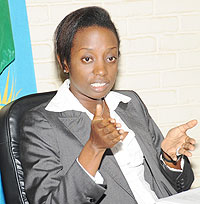Rwanda aims to have accurate and readily accessible data on its economy to guide development strategies, and the National Institute of Statistics of Rwanda (NISR) is targeting the establishment of an efficient civil registration system by 2014.


Rwanda aims to have accurate and readily accessible data on its economy to guide development strategies, and the National Institute of Statistics of Rwanda (NISR) is targeting the establishment of an efficient civil registration system by 2014.
This was announced Tuesday by Dr. Diane Karusisi, the acting Director General of NISR, during the launch of the country’s first ever National Strategy for the Development of Statistics (NSDS) at the Kigali Serena Hotel.
As revealed, civil registration is a system of continuous, permanent, compulsory and collective recording of information such as births, deaths and people’s marital status, in a country.
"This is a system that is still very weak. In Rwanda, people don’t register births, marriages – so, we want to engage with local leaders and make sure people will come to the district or the sectors, to register births, and other things, because we think it is important to know how our population is evolving,” said Dr. Karusisi.
She highlighted that among the programmes and activities planned for the next five years is the development of the civil registration systems.
"If we don’t know where we stand, it’s difficult to plan for the future. And, one of the big deliverables of this NSDS development period will be the development of an integrated district statistical system,” she said.
The project is supported by the Belgian Technical Cooperation (BTC).
Prof. Ben Kiregyera, a former director of the Africa Centre for Statistics at the UN Economic Commission for Africa (UNECA), and chairman of the Uganda Bureau of Statistics (UBoS), told the gathering – statisticians, government ministries and development partners, that there are only two countries in Africa [Mauritius and Seychelles] with adequate civil registration systems.
"Lack of civil registration systems in Africa has been called a scandal. A scandal in the sense that there are many people who are born, live and die without leaving a trace in official records of a country,” said Prof. Kiregyera.
According to the World Health Organization (WHO), counting births and deaths is important and countries need to know how many people are born and die each year – and the main causes of their deaths – in order to have well-functioning health systems.
WHO says it receives reliable, high-quality cause-of-death statistics from only 31 of its 193 Member States.
Ends


